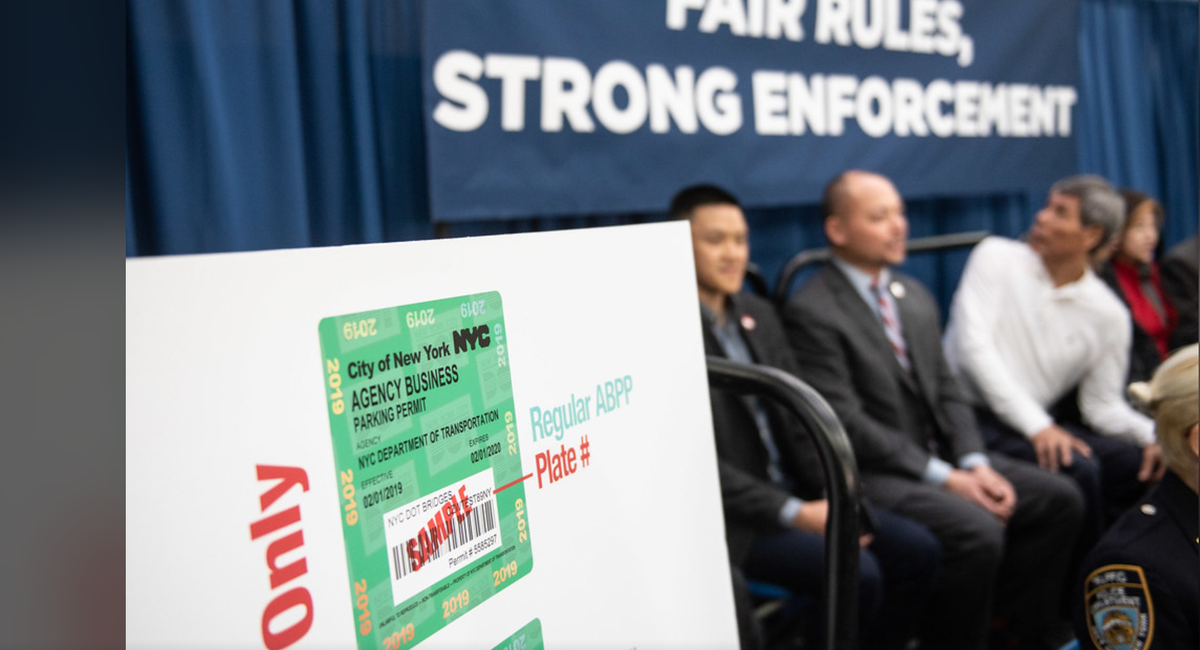New Yorkers are filing around 2,000 complaints per month to 311 alleging that city employees are misusing their parking placards to double park, obstruct crosswalks and park on sidewalks, city data shows. That’s about double the number of complaints at this time last year, according to Gothamist’s analysis.
The practice has persisted for years with minimal pushback. Earlier this year, the city Department of Investigation published a report — also based on 311 data — showing that the NYPD was doing little to enforce parking rules for cars with placards, which are intended for urgent city business. The report found that police took action in only about half of all cases submitted to 311. It also found that about a quarter of complaints were marked as “closed” within 20 minutes of submission — a suspiciously short window to actually fix a parking violation, the report’s authors noted.
Some policing experts say this lax attitude toward traffic enforcement may extend to other types of rule-breaking.
“If small violations like this are tolerated, not taken seriously, sometimes that’s an indicator that there are bigger problems,” said Lauren Bonds, executive director of the National Police Accountability Project, a project of the nonprofit National Lawyers Guild.
Gothamist’s analysis shows that reports of sidewalk parking were overwhelmingly clustered around NYPD precinct station houses. Brooklyn’s 78th Precinct station house has garnered hundreds of such complaints since 2020. A recent study found that city vehicles were parked illegally outside almost all police precinct station houses across the five boroughs.
An NYPD spokesperson did not return a request for comment.
City and federal watchdogs have called on police to stop the practice or face legal consequences. Gersh Kuntzman, who has covered placard abuse for years as editor in chief of Streetsblog, said the uptick in complaints could be due to increased oversight and media attention.
“If there’s a rise in complaints, it’s probably due to the awareness of the problem of placard abuse,” he said. “A lot of people [realized] that the first step is to report these things so that there’s a baseline.”
Gothamist analyzed roughly 49,000 placard abuse complaints submitted to 311 under a special code created especially to address placard abuse.
New Yorkers submitted just under 800 reports per month between January 2020 and March 2024, according to the data. The number of reports spiked in April, after the DOI report, and has remained high ever since.
New Yorkers submitted more than 2,200 placard abuse complaints in May alone, the analysis shows. Around 15% of the complaints made since April were marked as “closed” within 20 minutes, a slight improvement compared to the DOI report’s findings. But like the DOI’s report, Gothamist’s analysis found that police took action in just about half of all the complaints filed during that window.
Sidewalk parking is particularly cumbersome for New Yorkers with disabilities, said Sharon McLennon Wier, executive director of the Center for Independence of the Disabled, a New York-based advocacy group. Wheelchair users may not be able to pass on the narrow slice of sidewalk left unblocked, and a police vehicle may present an unexpected obstacle for a visually impaired pedestrian, forcing them out into the roadway.
“You’re risking your life to walk down the sidewalk,” said Wier, who is blind. It feels like city workers are prioritizing their own parking convenience over accessibility, she added.
“One able-bodied person’s convenience makes it a nightmare for those of us [who] are disabled,” she said.
In a letter this past spring, Damian Williams, the U.S. attorney for the Southern District of New York, warned the NYPD that its sidewalk and crosswalk parking practices violated the Americans with Disabilities Act. Williams even threatened a lawsuit if the problem wasn’t fixed.
“Together, these parking practices have made it such that the city’s pedestrian grid is not ‘readily accessible to and usable by individuals with disabilities,’’’ he wrote.
